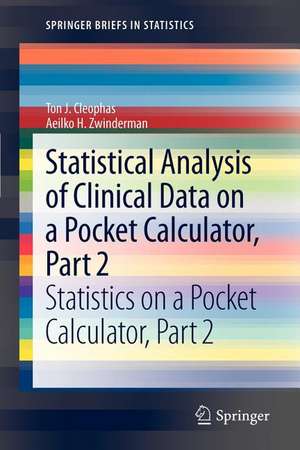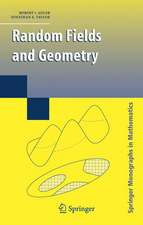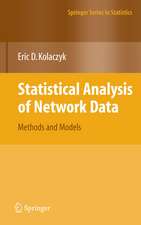Statistical Analysis of Clinical Data on a Pocket Calculator, Part 2: Statistics on a Pocket Calculator, Part 2: SpringerBriefs in Statistics
Autor Ton J. Cleophas, Aeilko H. Zwindermanen Limba Engleză Paperback – 28 iun 2012
Each test method is reported together with (1) a data example from practice, (2) all steps to be taken using a scientific pocket calculator, and (3) the main results and their interpretation. Although several of the described methods can also be carried out with the help of statistical software, the latter procedure will be considerably slower.
Both part 1 and 2 of this title consist of a minimum of text and this will enhance the process of mastering the methods. Yet the authors recommend that for a better understanding of the test procedures the books be used together with the same authors' textbook "Statistics Applied to Clinical Studies" 5th edition edited 2012, by Springer Dordrecht Netherlands. More complex data files like data files with multiple treatment modalities or multiple predictor variables can not be analyzed with a pocket calculator. We recommend that the small books "SPSS for starters", Part 1 and 2 (Springer, Dordrecht, 2010, and 2012) from the same authors be used as a complementary help for the readers' benefit.
Din seria SpringerBriefs in Statistics
-
 Preț: 378.34 lei
Preț: 378.34 lei - 15%
 Preț: 459.93 lei
Preț: 459.93 lei - 17%
 Preț: 359.75 lei
Preț: 359.75 lei -
 Preț: 411.54 lei
Preț: 411.54 lei -
 Preț: 445.88 lei
Preț: 445.88 lei -
 Preț: 445.33 lei
Preț: 445.33 lei -
 Preț: 378.71 lei
Preț: 378.71 lei -
 Preț: 375.23 lei
Preț: 375.23 lei -
 Preț: 378.71 lei
Preț: 378.71 lei -
 Preț: 350.50 lei
Preț: 350.50 lei -
 Preț: 378.54 lei
Preț: 378.54 lei -
 Preț: 378.71 lei
Preț: 378.71 lei - 15%
 Preț: 461.73 lei
Preț: 461.73 lei -
 Preț: 352.28 lei
Preț: 352.28 lei -
 Preț: 378.54 lei
Preț: 378.54 lei -
 Preț: 377.73 lei
Preț: 377.73 lei - 5%
 Preț: 360.70 lei
Preț: 360.70 lei -
 Preț: 351.42 lei
Preț: 351.42 lei -
 Preț: 378.92 lei
Preț: 378.92 lei -
 Preț: 375.07 lei
Preț: 375.07 lei -
 Preț: 342.74 lei
Preț: 342.74 lei -
 Preț: 444.35 lei
Preț: 444.35 lei -
 Preț: 414.42 lei
Preț: 414.42 lei - 15%
 Preț: 462.70 lei
Preț: 462.70 lei -
 Preț: 378.54 lei
Preț: 378.54 lei -
 Preț: 378.12 lei
Preț: 378.12 lei -
 Preț: 271.46 lei
Preț: 271.46 lei -
 Preț: 347.71 lei
Preț: 347.71 lei -
 Preț: 377.73 lei
Preț: 377.73 lei -
 Preț: 270.74 lei
Preț: 270.74 lei -
 Preț: 378.54 lei
Preț: 378.54 lei - 5%
 Preț: 327.04 lei
Preț: 327.04 lei -
 Preț: 377.18 lei
Preț: 377.18 lei -
 Preț: 273.40 lei
Preț: 273.40 lei -
 Preț: 377.18 lei
Preț: 377.18 lei -
 Preț: 379.30 lei
Preț: 379.30 lei -
 Preț: 376.59 lei
Preț: 376.59 lei -
 Preț: 379.68 lei
Preț: 379.68 lei -
 Preț: 272.04 lei
Preț: 272.04 lei -
 Preț: 378.54 lei
Preț: 378.54 lei -
 Preț: 379.09 lei
Preț: 379.09 lei -
 Preț: 446.26 lei
Preț: 446.26 lei -
 Preț: 375.84 lei
Preț: 375.84 lei -
 Preț: 344.14 lei
Preț: 344.14 lei -
 Preț: 348.72 lei
Preț: 348.72 lei -
 Preț: 377.95 lei
Preț: 377.95 lei -
 Preț: 269.71 lei
Preț: 269.71 lei - 5%
 Preț: 361.06 lei
Preț: 361.06 lei -
 Preț: 375.84 lei
Preț: 375.84 lei -
 Preț: 442.62 lei
Preț: 442.62 lei
Preț: 325.61 lei
Preț vechi: 342.74 lei
-5% Nou
Puncte Express: 488
Preț estimativ în valută:
62.30€ • 65.23$ • 51.55£
62.30€ • 65.23$ • 51.55£
Carte tipărită la comandă
Livrare economică 05-19 aprilie
Preluare comenzi: 021 569.72.76
Specificații
ISBN-13: 9789400747036
ISBN-10: 9400747039
Pagini: 90
Ilustrații: IX, 78 p. 12 illus.
Dimensiuni: 155 x 235 x 13 mm
Greutate: 0.14 kg
Ediția:2012
Editura: SPRINGER NETHERLANDS
Colecția Springer
Seria SpringerBriefs in Statistics
Locul publicării:Dordrecht, Netherlands
ISBN-10: 9400747039
Pagini: 90
Ilustrații: IX, 78 p. 12 illus.
Dimensiuni: 155 x 235 x 13 mm
Greutate: 0.14 kg
Ediția:2012
Editura: SPRINGER NETHERLANDS
Colecția Springer
Seria SpringerBriefs in Statistics
Locul publicării:Dordrecht, Netherlands
Public țintă
Professional/practitionerCuprins
Preface.-1 Introduction.-2 Basic logarithm for a better understanding of statistical methods.-3 Missing data imputation.-4 Assessing manipulated data.-5 Propensity scores and propensity score matching for assessing multiple confounders.-6 Markov modeling for predicting outside the range of observations.-7 Uncertainty in the evaluation of diagnostic tests.-8 Robust tests for imperfect data.-9 Non-linear modeling on a pocket calculator.-10 Fuzzy modeling for imprecise and incomplete data.-11 Goodness of fit tests for normal and cumulatively normal data.-12 Bhattacharya modeling for unmasking hidden Gaussian curves.-13 Item response modeling instead of classical linear analysis of questionnaires.-14 Superiority testing instead of null hypothesis testing.-15 Variability analysis with the Bartlett’s test.-16: Binary partitioning for CART (classification and regression tree) methods.-17 Meta-analysis of continuous data.-18 Meta-analysis of binary data.-19 Physicians’ daily life and the scientific method.-20 Incident analysis and the scientific method. Final remarks. Index.
Textul de pe ultima copertă
The first part of this title contained all statistical tests relevant to starting clinical investigations, and included tests for continuous and binary data, power, sample size, multiple testing, variability, confounding, interaction, and reliability. The current part 2 of this title reviews methods for handling missing data, manipulated data, multiple confounders, predictions beyond observation, uncertainty of diagnostic tests, and the problems of outliers. Also robust tests, non-linear modeling , goodness of fit testing, Bhatacharya models, item response modeling, superiority testing, variability testing, binary partitioning for CART (classification and regression tree) methods, meta-analysis, and simple tests for incident analysis and unexpected observations at the workplace and reviewed.
Each test method is reported together with (1) a data example from practice, (2) all steps to be taken using a scientific pocket calculator, and (3) the main results and their interpretation. Although several of the described methods can also be carried out with the help of statistical software, the latter procedure will be considerably slower.
Both part 1 and 2 of this title consist of a minimum of text and this will enhance the process of mastering the methods. Yet the authors recommend that for a better understanding of the test procedures the books be used together with the same authors' textbook "Statistics Applied to Clinical Studies" 5th edition edited 2012, by Springer Dordrecht Netherlands. More complex data files like data files with multiple treatment modalities or multiple predictor variables can not be analyzed with a pocket calculator. We recommend that the small books "SPSS for starters", Part 1 and 2 (Springer, Dordrecht, 2010, and 2012) from the same authors be used as a complementary help for the readers' benefit.
Each test method is reported together with (1) a data example from practice, (2) all steps to be taken using a scientific pocket calculator, and (3) the main results and their interpretation. Although several of the described methods can also be carried out with the help of statistical software, the latter procedure will be considerably slower.
Both part 1 and 2 of this title consist of a minimum of text and this will enhance the process of mastering the methods. Yet the authors recommend that for a better understanding of the test procedures the books be used together with the same authors' textbook "Statistics Applied to Clinical Studies" 5th edition edited 2012, by Springer Dordrecht Netherlands. More complex data files like data files with multiple treatment modalities or multiple predictor variables can not be analyzed with a pocket calculator. We recommend that the small books "SPSS for starters", Part 1 and 2 (Springer, Dordrecht, 2010, and 2012) from the same authors be used as a complementary help for the readers' benefit.
Caracteristici
Methods that are easy on a pocket calculator and difficult on a software program are reviewed You better understand what you're doing Methodologies for which there is little software are reviewed Pocket calculators work faster, because summary statistics are used Includes supplementary material: sn.pub/extras Includes supplementary material: sn.pub/extras












